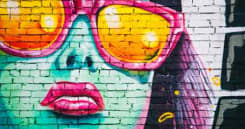Emotions that may be difficult or scary to express in talking therapy can be easier to recognize and express through music and art therapy.
For those addicted to drugs and alcohol, recovery and sobriety may seem difficult, overwhelming, or even impossible. Traveling far from friends and family to dive deep into your emotional, spiritual, and physical well-being might sound isolating or deeply painful—but it doesn’t have to be.
At Hawaiian Island Recovery, we strive to offer a wide range of therapies that make your experience a positive one.
Instead of “isolating” or “overwhelming,” you’ll likely use words like “beautiful,” “life-changing,” and “memorable” to describe your time with us.
Meet Our Music and Art Therapist
Among our creative and effective therapy options are music and art therapy, directed by nationally board-certified music therapist Devora Kalma MA MT-BC.
Kalma has been working in mental health since 2008 and facilitates evidence-based music, movement, art, and poetry experiences.
Kalma explains, “In my groups, we explore music, we listen to songs, we talk about how we feel during the songs, we write songs about our lives. We also explore different artistic mediums—painting and poetry and collage—and we use it as a way to tap into feelings and thoughts that maybe aren’t so easy to access when you’re just talking.”
Emotions that may be difficult or scary to express in talking therapy can be easier to recognize and express through music and art. Devora tells residents that music can be used “as a soft spotlight on feelings, thoughts, bodily sensations, and spirituality.”

Using art therapy for depression may sound like it’s not the most professional approach to treatment but it’s become more helpful than you might imagine.
More infoDiscovering Yourself Through Music And Art Therapy
The 12 step program that was originally created by Alcoholics Anonymous and now guides the recovery process at HIR involves “recognizing a higher power that can give you strength.” For many residents, music and art therapy help them accomplish that goal.
Kalma explains, “These groups are about knowing ourselves as creative forces in our own lives, in our own recoveries and well-being.”
Music and art therapy provides participants with an opportunity to tap into “that God-given artistry that we all have, the unique arts that we all are.”
Then, Kalma says, residents are “able to use that creativity to lift our spirits, to comfort ourselves, to connect with others, and to feel better.”
Scientifically-Backed Therapy
You may be thinking to yourself, “It sounds interesting… but does it really work?”
Music and art therapy have been used in drug rehab for decades, and many studies confirm their effectiveness as part of a well-rounded rehab program.
Researchers report that art therapy first appeared in substance abuse treatment in the 1950s. Findings suggest that art therapy can encourage:
- Decreased denial
- Reduced opposition to treatment
- An outlet for communication
- A lessening of shame
- Facilitation for group discussions
- Motivating life change
In the 1970s, therapists began adding music therapy to their approach in treating substance abuse. Findings suggest that the benefits of music therapy may include:
- Positive emotional change
- Relaxation
- Decreased anxiety, depression, anger, and stress
- Increased willingness to participate in treatment
At Hawaiian Island Recovery, music and art therapy is just one example of a wide array of unique but proven methods for treating addiction—including dolphin and equine therapy, yoga and massage, and more.
Kalma shares, “I’m truly blessed to be part of a center that offers so many holistic and experiential and unique therapies that are also evidence-based and scientifically-founded.”
Join Us At Hawaiian Island Recovery
If you’ve been afraid of entering rehab, we’d love to show you how your journey to sobriety can be beautiful, powerful, and even fun!
Browse our blog for a closer look at the HIR experience, check out our testimonials and hear from former residents, or call us today for a confidential assessment.
 Hawaii Island Recovery
Hawaii Island Recovery 










